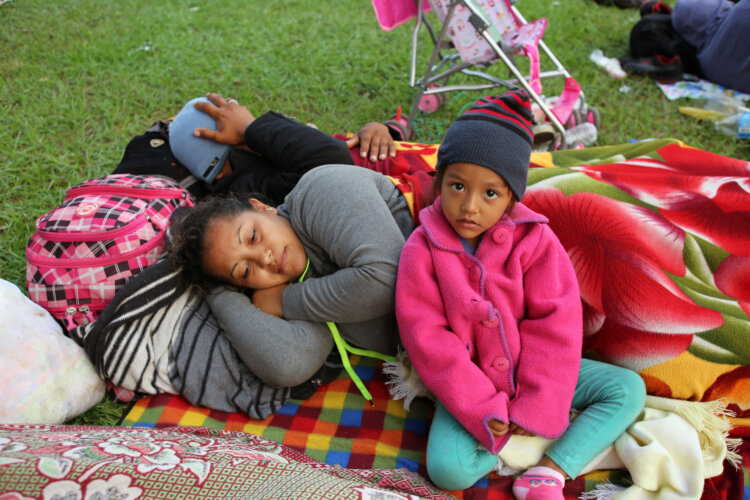
Like many people, I watched in horror as the crisis at the U.S.-Mexico border unfolded in April 2018. According to the Department of Homeland Security, almost 2,000 children were forcibly removed from their parents and placed into group housing during those first six weeks of the “zero-tolerance policy.” I cried while listening to ProPublica’s audio of children sobbing and calling out for their parents while holding my own babies. I felt for those babies, and I felt for their mothers. Many other people felt for them as well, and the legal aid fund RAICES was created to help parents reunite with their children. Fortunately, the policy of separating children from their parents has been halted, but some of the consequences may remain.
Postpartum depression hits migrant mothers the hardest
For mothers suffering from postpartum depression, it is not only easy to imagine your children crying out for you, it is practically a compulsion. Dr. Nikole Benders-Hadi, a board-certified psychiatrist, explains that some mothers may have begun “catastrophizing,” or imagining the worst possible outcomes in their own lives, after witnessing or hearing about these separations.
“Postpartum depression affects 1 in 5 women today, and migrant mothers are no exception,” she says. “With the added stress of caring for a newborn while also escaping crime, victimization, and other abuses in their home country, the risk for migrant mothers of developing depression in the postpartum period is even higher.”
According to a study completed in 2017, postpartum depression rates are higher in migrant mothers than in any other group. Factors like absence of familial support, unemployment and a questionable immigration status have led to these increased rates. Not to mention the fact that many of these women are fleeing persecution, trauma and violence to begin with. They make the long journey to the U.S.—sometimes facing as much danger during their travels as what they were trying to escape from—with the hope that they will be providing a better life for their families. Unfortunately, they often find themselves at an increased risk of further trauma along the way, exacerbating any symptoms of postpartum depression they were already experiencing, or causing the condition to manifest for the first time.
A lack of viable treatment options
Although these mothers suffer from postpartum depression in larger numbers, they are the group that is least likely to seek treatment. They lack the financial resources to pay for healthcare, and language barriers and cultural stigma are also a deterrent. According to Dr. Kim Langdon, an OBGYN who practiced for 19 years, in some regions there is still shame associated with mental illness. “This is especially true of immigrants from countries that do not accept mental illness as a medical condition, rather something that they should ‘just get over.’”
There are increased risks for these families. Dr. Langdon explains that mothers suffering from untreated postpartum depression may have a diminished capacity to cope, limiting their ability to properly care for their children. They may also experience fatigue, trouble concentrating and difficulty when it comes to dealing with anger.
In my case, even with all of the available resources in the world at my fingertips, I found it hard to get diagnosed and receive treatment for my postpartum depression. Someone who does not speak the language, has no support system and limited finances would find it virtually impossible to receive medical treatment.
There is help available
Thankfully, there are ways to get these women help. Dr. Langdon says that treatment options can be successful as long as they take language barriers, cultural expectations and privacy into consideration. If help is presented to them in a way where they do not have to ask for it, treatment may be more successful. “Mother support groups may be an easier way to gather the women,” explains Dr. Langdon “And from there, private individual assessments can be offered under the guise of a routine ‘support group.’”
While making healthcare accessible to everyone is still an ongoing political issue, caring for the most vulnerable among us should be top priority. This includes children, and their mothers who risked everything they had in order to give them the best life possible.
How you can get involved
There are many groups working closely with migrant families all over the country, but the ones located along the US border are seeing their resources especially taxed right now. You can help ease some of the financial strain of these families by donating to groups like the Texas Diaper Bank, which provides diapers to low income and immigrant families or the Catholic Charities of California, which provide assistance to immigrant families that ranges from healthcare services to emergency shelter (regardless of religion). You can also search their US database to see if a location near you is looking for volunteers.
By contributing financing, supplies, or even a bit of your time you may be able to make a world of difference for a migrant mother in need.


Grok Nation Comment Policy
We welcome thoughtful, grokky comments—keep your negativity and spam to yourself. Please read our Comment Policy before commenting.